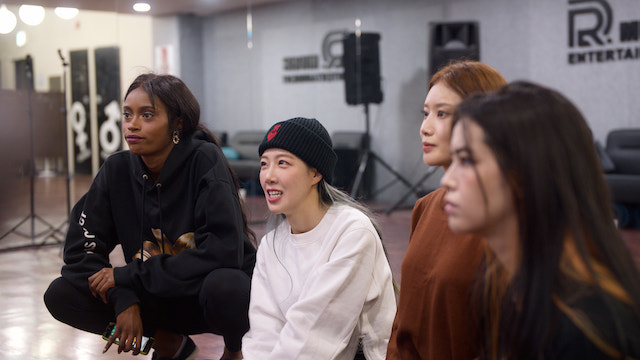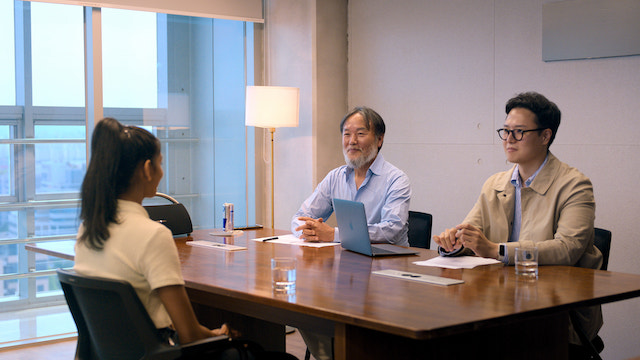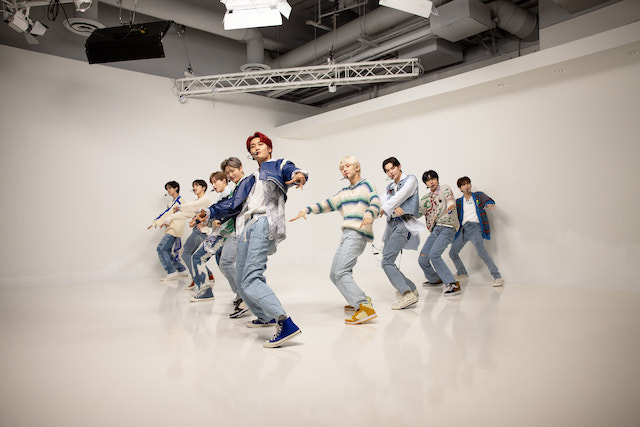

©Courtesy of Apple TV+
Q: They have so many K-pop groups in Korea. Before you started this project, how did you narrow it down to which K pop group to actually cover in this series? Could you talk about that?
Jack Turner: Sure, Brad, do you want to talk about that?
Bradley Cramp: Yeah, the whole project really started with just the personal relationships with the agencies. And yeah, so really that’s how it started because as I’m sure you know, it’s hard to just call up a K-Pop agency or a group and say, ‘Hey, I want to make a documentary on you and go to your CEO’s house and hang out.’
So it really did start with personal relationships. I had come over to Korea for a different project and I ended up staying a lot longer than I had anticipated. And I ended up getting to know a lot of the folks here in the industry. And one thing led to another, and I said, ‘Oh, this would make an amazing documentary series.’
And then Apple got involved—Matador, at least the whole team. And so it really did start with the personal relationships, and really the huge component of that was just them having the trust in us to tell their story in a genuine and understanding and culturally sensitive way.
Q: Oh, you’re basically talking about DR music, right?
Bradley Cramp: Yes, and the relationship of Starship Entertainment and Jesse as well. Yeah, so they all began just with the personal relationship.
Q: What elements of the K-pop group and artists do you think differ from other countries? Because when it comes to actually training, or learning other languages, they are more rigorous as compared to probably other countries. Could you talk about that?
Bradley Cramp: Jack, or Elise, do you want to tackle that, or do you want me to start?
Jack Turner: Go ahead. You can go
Bradley Cramp: What I found personally fascinating about K-Pop and the training system, and just that world, was just the amazing dedication and intensity to which these artists train, and what they’re willing to sacrifice in order to achieve their dreams. The level of teamwork, and just personal dedication and sacrifice that these artists commit to it at such a young age is just—I found it to be incredibly fascinating just from a human perspective, but also very inspiring just in terms of a work-ethic experience.
Jack Turner: In some ways in our discussions about the project, it’s like looking at the level of celebrity and their training to be a K-Pop idol. It’s almost like the notion of being a celebrity in the U.S., a sports star, and a politician all at the same time. Yeah, that’s the level of training scrutiny and exposure that these artists have, and navigating it at a young age is really truly extraordinary.

©Courtesy of Apple TV+
Q: This series also covers the CEO and some top levels of label companies. What are their tactics and the mindsets that surprised you most about the global promotional approach from their perspective?
Bradley Cramp: I can start off with that one. What I found interesting in terms of just how the different agencies think—and there’s over 300 different agencies in Korea making K-Pop—is that there’s a whole hierarchical pyramid, right? You have the top four, and then you have all these other mid-size and lower- level agencies, and they’re all trying to crack this formula of how can we not only achieve success in our local Korean and Asian market, but how do we transfer that popularity overseas to really tap into the very lucrative Western market.
So everybody’s got their formula that they’re trying to figure out. And a lot of it is gut instinct and massive amounts of data that they use to try to figure this out. But at the end of the day, I think so much of it is just about the casting of the idols themselves in these groups. Some of them just work so well as teams, and you add the music and once you hit the right formula on all these different fronts, then you’ve got a hit, right?
Then you’ve got a group that could literally have an entire career in spin-off groups and all kinds of other things. Everybody’s trying to crack the formula, and there’s a lot of copying that goes on out there, right? Just like in Hollywood, right? Everybody’s trying to follow the Coca-Cola formula of success.
And how do you add on to that to make it unique, but yet familiar enough that it captivates the hearts and minds of a global audience? And that’s what everybody’s chasing after. Whether it’s music or film or TV, right?
Q: Are there any K-Pop groups and artists that hooked you to K-Pop music in the first place? I’m curious to know what got you to the K-Pop groups in the first place. Which were the music groups that you listened to?
Bradley Cramp: I mean for me it was the group Twice and I actually watched a TV show with my teenage daughter where that group was formed. And that’s what started to get me interested in K-Pop. And I just liked the music. It was just very catchy and happy, not dark and foreboding. And I started listening to it in the car with my daughter, and then that let us down the rabbit hole of all these other groups.
And of course, we love Blackpink, BTS and 2NE1 and all these other groups going back even further. But, yeah, that was my personal entrance point into this world. I don’t know about Jack or Elise.
Elise Chung: My first exposure to K-Pop was back in the 90s with H.O.T. My friends were obsessed with H.O.T., and with g. o.d., that whole era. And so that was my first exposure. And then when I came across this project, it was like my reintroduction to K-Pop and this new generation, which is just the production value, the dancing, the entertainment. It’s just all so alluring. You can’t stop watching.

©Courtesy of Apple TV+
Q: How about you, Jack?
Jack Turner: Yeah, I would say a lot of the same influences, but also, what drew me to this project in particular was that K-Pop is just one aspect of the explosion of South Korean culture, and food and entertainment. The effect that Korean film and television has had on Hollywood is extraordinary. And so with K-pop, we started having the notion that we would be able to actually have access to artists and the labels. It was just an opportunity that we couldn’t turn down. And really it was born out of the relationships that Brad created. But as far as a group to anyone, Sharpe should get a shout-out because they’re amazing.
Q: Could you talk about filming the first performance of Blackswan and Cravity? Because they become so emotional. The families came in and all that. So, could you talk about actually filming that first concert for their performance there.
Bradley Cramp: Sure. I mean in terms of filming with Blackswan in particular it really just started very low key at first. And we just—it was just like showing Apple that we had this access. And we didn’t know that we were going to end up following the kind of implosion and then the rebirth of this group over the course of the series.
We didn’t even know that we were going to end up following the first ever Indian K-Pop idol Sriya, who is featured in this series. That was all just a beautiful, happy accident, as was the journey of following them through their ups and downs and witnessing all of this—the artists and even the staff members of the companies.
They became very comfortable with us in sharing their emotions going through this journey. So we really felt like we were also a part of this journey in going through it with them. And the fact that they opened up their homes and offices and dorm rooms and also their hearts to us.
I’m incredibly appreciative for the deep level of trust that they put in us and our production team. I don’t know if anybody wants to add to that. The trust and the access dictated the direction of the series, and that was what allowed us to follow these storylines.
And as Brad said, over the course of three years, four years, so many things changed. Doing a K-Pop story over the course of six months would not give you as much story as something that took this much time. And we were able to pull together a series that shows virtual growth over the course of this time period. And that’s what we’re so proud of the series and excited for our audiences to see that as well.
Q: Speaking of emotion, there’s a fight that actually happened right after the Blackswan concert. And all the members of Blackswan were actually in Fatou’s house. And to me, obviously they had their own opinions and all that. But at the same time, it might be so difficult because they’re at such a young age, and doing this for a long time, and they’re not seeing much of their family for a long time. That might be a significant reason for this falling out. How carefully does the label have to deal with those types of issues? Could you talk about that?
Elise Chung: Sure. Yeah, you’re exactly right. I feel like there are all of these external factors that really magnify the struggles that our characters go through, Fatou hasn’t seen her family for two years, Leia hasn’t seen her family for years, and so I feel like you do–about the compounding effect of all that pressure.
And I think you’re right that does feed into the struggles and the fights that you’re seeing. And yeah, as you probably saw in episode two as well–you do see how the label plays a factor in managing their image which is what we all see as fans and viewers. But I think what our series had the opportunity to do was see the behind the scenes of that: where you do get an inside look at how labels and management deal with issues like that.
Q: Could you talk about DR Music? Could you compare them to other labels? What was their difference, because they seem to me like a family-oriented label compared to the others. So could you talk about DR Music, how they operate there as compared to the other labels?
Bradley Cramp: Yeah, I think that’s what was so interesting about including DR music in the stories because they really are a family company, right? It’s such a great father and son story, especially compared to a larger agency like Starship Entertainment that Cravity and Monster X are under.
So seeing the different ways that different companies at different levels of the industry operate, how they handle problems, how they just do their casting, how they create their music videos. It was a very interesting compare and contrast between the worlds of a company like Starship and one like DR music. I don’t know, Jack, at least if you want to add anything to that…
Elise Chung: No, I was going to say, thank you.
Jack Turner: And then Mr. Yoon [CEO of DR Music] and Phillip [his son] are just phenomenal characters. They opened up their doors to us completely. And in doing so, they just gave us a totally different perspective. And, yeah you said family=oriented company. We’re inside the head of the company’s home, seeing family photos and meeting the family. That’s not something that you necessarily would get with other labels, and hopefully it’s a better story for it.
Q: Elise, do you want to add to that? Okay.
Elise Chung: I was just going to say, yeah, and I think you see a difference in motivation too with DR Music just because they are small and more family oriented and they have the liberty to take more risks. So yeah, it’s definitely a different look at the labels’ perspective.

©Courtesy of Apple TV+
If you like the interview, share your thoughts below!
Check out more of Nobuhiro’s articles.
Here’s the trailer of the film.

